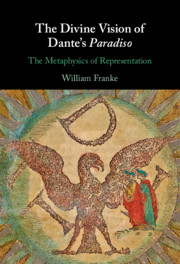Book contents
- The Divine Vision of Dante’s Paradiso
- The Divine Vision of Dante’s Paradiso
- Copyright page
- Contents
- Figures
- Prologue
- Acknowledgments
- Note on Translations and Primary Source Editions
- Part I The Literary Vision
- Part II Philosophical Reflections
- Excursus I Writing and Visionary Immediacy: Mechanics and Mysticism of the Letter
- Excursus II Saussure and the Structuralist Idea of Language as a System of Differences
- Excursus III Temporalization and Transcendence of Time through Language
- Excursus IV Transcendental Reflection: Time Synthesis and the Role of the “I”
- Excursus V Unmanifest Wholeness of Sense: Language as Image of the Imageless
- Excursus VI Transcendentality of Language and the Language of the Other
- Appendix Paradiso XVIII. 70–136
- Index
Excursus V - Unmanifest Wholeness of Sense: Language as Image of the Imageless
from Part II - Philosophical Reflections
Published online by Cambridge University Press: 26 August 2021
- The Divine Vision of Dante’s Paradiso
- The Divine Vision of Dante’s Paradiso
- Copyright page
- Contents
- Figures
- Prologue
- Acknowledgments
- Note on Translations and Primary Source Editions
- Part I The Literary Vision
- Part II Philosophical Reflections
- Excursus I Writing and Visionary Immediacy: Mechanics and Mysticism of the Letter
- Excursus II Saussure and the Structuralist Idea of Language as a System of Differences
- Excursus III Temporalization and Transcendence of Time through Language
- Excursus IV Transcendental Reflection: Time Synthesis and the Role of the “I”
- Excursus V Unmanifest Wholeness of Sense: Language as Image of the Imageless
- Excursus VI Transcendentality of Language and the Language of the Other
- Appendix Paradiso XVIII. 70–136
- Index
Summary
Language incarnates the structurally absent sense or meaning of the mind in the presence of concrete, sensory signifiers. Dante displays the wholeness of sense in the fragmentary form of letters and even exacerbates their disintegration. So eternity appears as broken in time. Techniques of ekphrasis play with the discrepancy between different sensory modalities, bringing out their inevitable incompleteness, in order to open a perspective on the unrepresentable. However, the divine Logos ever since Heraclitus has been apprehended as a binding together of all things in making Being manifest, as Heidegger shows. The λέγειν or tying–binding that is the essence of language also for Dante (Convivio IV. vi. 3–4), is revealed through the historicality of language as something transcending, commanding, and mastering all possible human acts. The root sense of the Logos as tying and binding (legare) lies at the heart of Dante’s sense of the poet as binder (auieo) tying all things together through vowels as the ties between letters composing words. These figures evoke the already gathered Gathering that conditions the very possibility of history and event in their radical possibility as disclosure (aletheia). The reader gathers (leggere) what is gathered together already in Scripture, as well as in the world through the Logos revealed as universal Justice.
- Type
- Chapter
- Information
- The Divine Vision of Dante's ParadisoThe Metaphysics of Representation, pp. 244 - 261Publisher: Cambridge University PressPrint publication year: 2021



